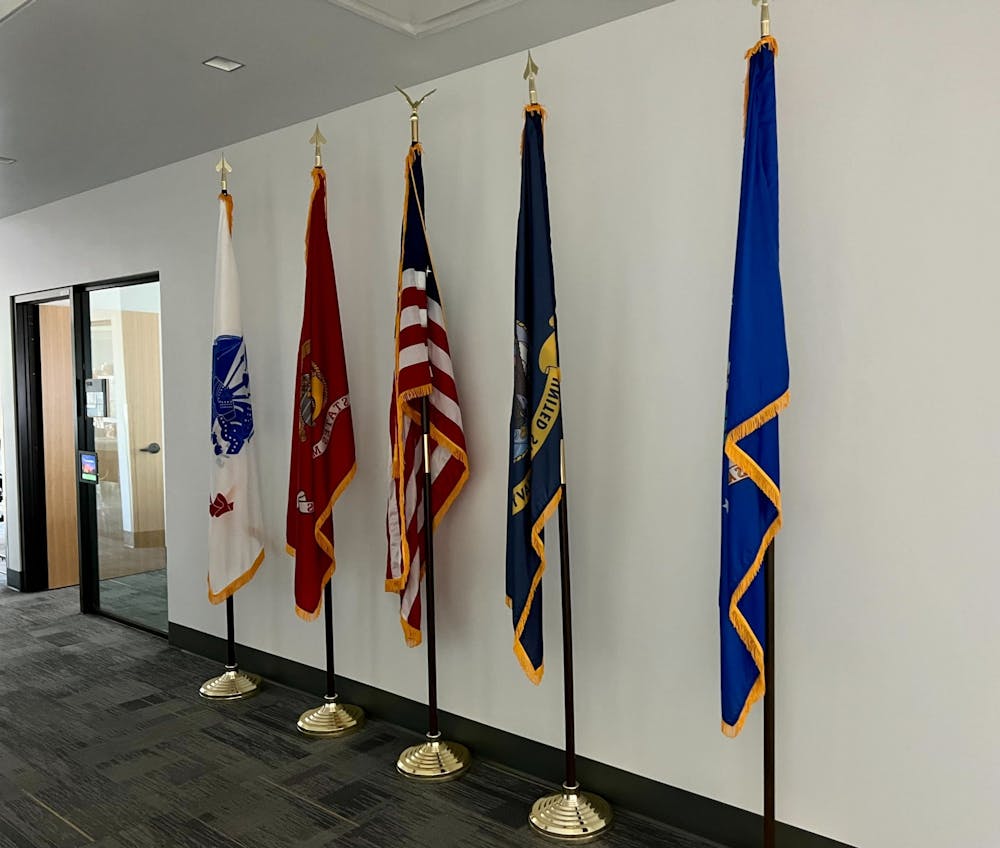Shawn Banzhaf served in the Army National Guard for 21 years before coming to ASU. He earned the Bronze Star and Combat Action badge, he is an Iraq War veteran and executed 100 combat missions around Baghdad, Fallujah and Ramadi.
When he retired there was still a transition he had to make as he left his friends and his team which was all he knew in the military.
"When someone in the military leaves, it feels like they lost their value," Banzhaf said. "You find your value in the military as a team and when you unplug, you question what is your value."
Banzhaf wanted to join the battle for mental health after he lost one soldier to war and five teammates committed suicide within the last 15 years of his retirement.
"What's more dangerous? Fighting against improvised explosive devices or trying to fight against this mental health problem?" Banzhaf said.
He knew he had to do something about it and now he strives to help student veterans at ASU find their careers and make sure they get the support they need in their transition as the new executive director of ASU's Pat Tillman Veterans Center.
Community development and research are the keys to helping student veterans feel like they have a purpose at ASU after their time in the service. Banzhaf wants to build outreach for veterans who are starting over in their education after serving in the military.
ASU is a yellow-ribbon school that dedicates research to the student veteran population in order to find out what causes them to develop mental illness and how they can work toward solutions. Veterans come out of the service feeling like they have no more value. In the United States, 22 veterans die from suicide each day. Research teams have been assembled to combat this issue and make sure veterans are able to better live their lives after service.
Shawn Youngstedt, an ASU College of Health Solutions professor, has done research on the risks of long sleep. He started studying it at the University of South Carolina, finding that veterans struggle with insomnia which correlates to post-traumatic stress disorder.
He conducted a trial at USC where they performed a bright light treatment for veterans who had PTSD.
"Bright light has been used for many years for winter depression and works just as well for non-seasonal depression," Youngstedt said. This can also help with boosting moods and can prevent diseases and disorders. It has a crucial impact on the brain that can enhance one's ability to learn.
He was just one of the researchers involved at ASU in finding ways to combat mental illness among veterans. Youngstedt said he would like to work more with veterans and research potential solutions to the mental illnesses they have.
Along with research, PTVC is a resource that specifically supports the over 7,000 student veterans at ASU. They have two houses, one working to make sure students get GI Bill benefits which help them pay for college and the other is the student advocacy team.
One senior success advocate Beno Thomas, who aims to give students a bit of continuity in their transition into college life, said when people leave the military they are leaving the community and culture they have been in for years.
"I think military veterans, their dependents and spouses are craving a continuation of that community when they get here," Thomas said.
PTVC tries to make ASU's campuses feel like home with its flag display bringing positive nostalgia students might need.
In the first two years after the service, student veterans struggle with their mental health the most.
"What's important for them to see is that after getting out, we all can become successful professionals," Thomas said. "In extreme circumstances, those first two years can be lethal."
The students who are not used to college stressors are who the PTVC is there for. Thomas helps with student success and finds resources.
One resource that is crucial for student veterans is community outreach. PTVC has gotten better at recognizing that it needs to go to students through social media in order to find who is struggling.
Banzhaf wrote a book about life in the service and trauma. The book has helped his students cope with mental illnesses.
He teaches two courses at ASU including the success for veterans course, like an ASU 101 class, and the representations of veterans class that help students adjust to college culture and new trends.
"It's not easy when you have served in such a way in the military," Banzhaf said. "There are times they'll come to me and say 'I don't know if anyone even gets me or understands me.'"
Banzhaf continues to help students succeed in the classroom and in their military community as PTVC has veteran support circles and sponsor teams.
"All these different pieces and parts trying to help build community so that student veterans can feel like they belong," Banzhaf said.
PTVC is the biggest in the nation and it continues to promote the community to students who have not disclosed they are veterans, but Banzhaf said the center will always have a place for them, they just have to reach out.
Edited by Piper Hansen, Wyatt Myskow, David Rodish, Sophia Balasubramanian and Kristen Apolline Castillo.
Reach the reporter at lboykins@asu.edu and follow @BoykinsLauren on Twitter.
Like State Press Sports on Facebook and follow @statepresssport on Twitter.




